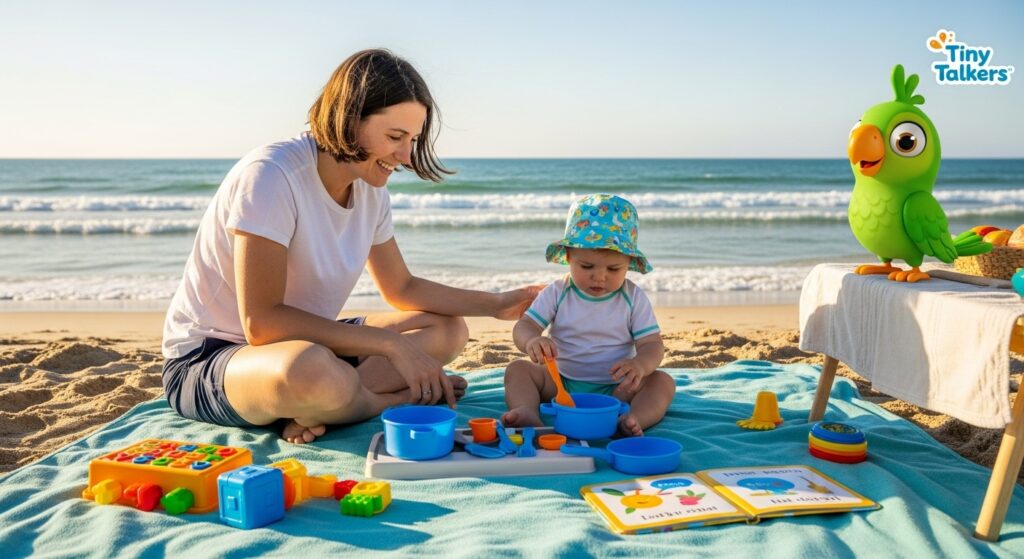Cooking with toddlers is not just a chance to prepare meals together; it’s a wonderful opportunity to engage in playful learning that can boost their language development. Infusing language games into your cooking routine can transform a mundane task into an enriching experience for your child. Let’s explore how to make the most of your time in the kitchen with these interactive language activities.
The Benefits of Language Games in the Kitchen
Engaging in language games while cooking provides multifaceted benefits. It fosters a rich environment for vocabulary expansion, enhances listening skills, and strengthens the bond between you and your toddler. By incorporating language activities into cooking, you can create an immersive learning experience that naturally encourages your toddler to express themselves.
Vocabulary Building Through Ingredients
Cooking introduces your toddler to a diverse range of ingredients, each with its own unique textures, colors, and smells. Use this opportunity to expand their vocabulary.
- Name the Ingredients: As you gather ingredients, name each one out loud. Say, “This is a carrot. It’s orange and crunchy,” or “Here is some flour; it’s soft and powdery.” Repetition is key, so try to repeat the names as you handle each item.
- Descriptive Language: Talk about the attributes of each ingredient. Use descriptive words like “smooth,” “sweet,” “bitter,” or “spicy.” This helps toddlers associate words with sensory experiences.
Counting and Numbers
Cooking is a practical way to introduce basic math concepts such as counting, measuring, and sequencing.
- Counting Game: Encourage your toddler to count items as you cook. Count out loud the number of carrots to slice or scoops of flour to add. This simple activity reinforces number recognition and counting skills.
- Measuring Fun: Involve your child in measuring ingredients. Use this time to introduce concepts of “more” and “less,” or “full” and “empty.” Explain, “We need one cup of water” and let them fill the cup, enhancing both language and math skills.
Sound Play With Kitchen Tools
The kitchen is full of sounds that can captivate a toddler’s attention. Use these sounds to create engaging language games.
- Sound Identification: As you cook, highlight the different sounds made by various kitchen tools. Ask questions like, “What sound does the whisk make?” or “Can you hear the blender?” This game encourages auditory discrimination and helps in developing listening skills.
- Rhyming Fun: Introduce rhyming words associated with cooking sounds. Say, “The pan goes sizzle, sizzle, like a drizzle.” Rhyming helps toddlers recognize phonetic patterns, which is crucial for language development.
Storytelling and Imaginative Play
Cooking can transform into a storytelling adventure, sparking your toddler’s imagination and narrative skills.
- Create a Cooking Story: Build a story around the recipe you’re making. For example, “Once upon a time, there was a brave little tomato who wanted to join the vegetable soup party.” Invite your child to add to the story, encouraging them to use their imagination and practice constructing sentences.
- Role Play: Turn your kitchen into a pretend restaurant where your toddler is the chef. They can “take orders” and describe the dishes they are “cooking.” This role-playing scenario fosters conversational skills and vocabulary use.
Following Directions
Cooking activities require following a sequence of steps, which can help toddlers practice their listening and comprehension skills.
- Simple Instructions: Start with simple, clear instructions and ask your toddler to repeat them. For instance, “First, wash the apples. Next, cut them into slices.” This practice helps them understand sequencing and process language.
- Interactive Questioning: Encourage your toddler to ask questions about what comes next or why certain steps are important. This interaction promotes curiosity and comprehension skills.
Tips for Successful Kitchen Language Games
To make the most of your cooking sessions, consider these helpful tips:
-
Safety First: Always ensure your toddler’s safety by keeping sharp or hot objects out of reach. Use child-safe utensils and supervise closely.
-
Keep It Fun: Maintain a playful and relaxed atmosphere. Avoid frustration by keeping expectations realistic and celebrating small milestones.
-
Be Patient: Language development is a gradual process. Be patient and encourage your child’s efforts, no matter how small.
-
Adapt to Your Child’s Interests: Tailor the games to your child’s interests. If they love animals, incorporate animal-themed stories or sounds into your cooking activities.
Conclusion
Cooking with your toddler can be a delightful journey of exploration and learning. By incorporating language games into your kitchen routine, you not only make cooking more enjoyable but also support your child’s language development in a meaningful way. Remember, the goal is to create a positive and engaging environment where your toddler feels encouraged to express themselves. With each session, you are nurturing a love for language, learning, and, of course, delicious food. Enjoy these precious moments of discovery together, knowing that you’re laying the foundation for your child’s bright linguistic future.

